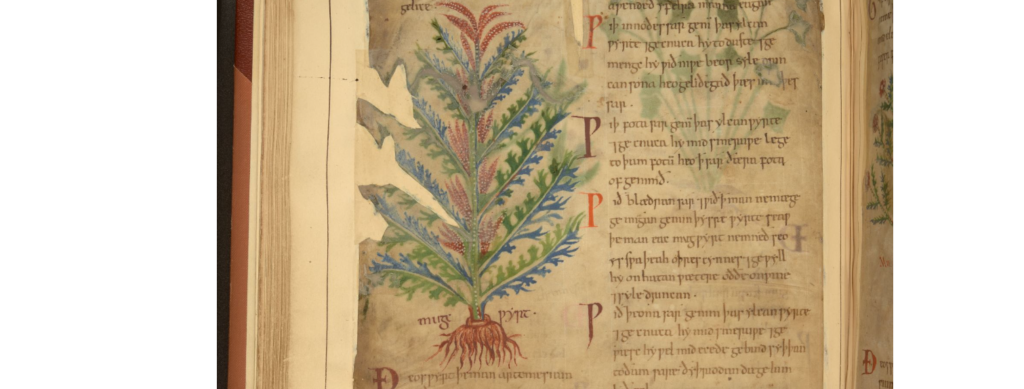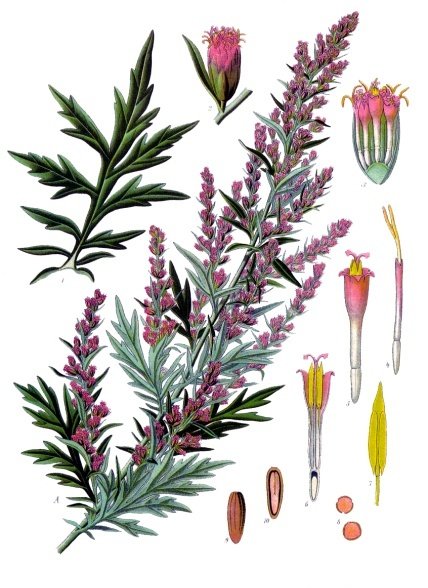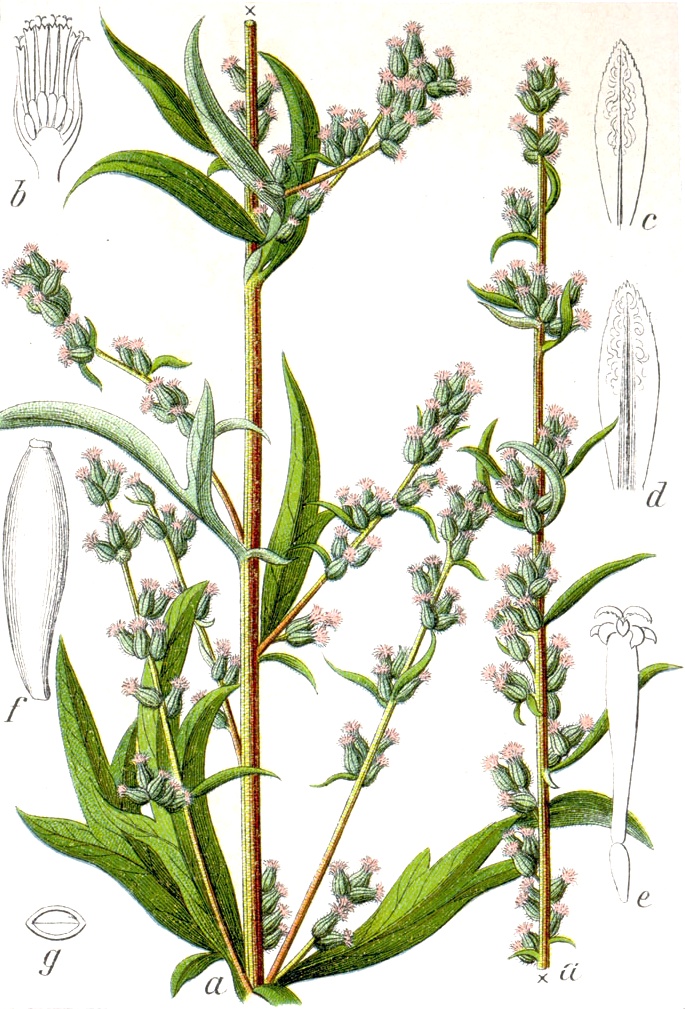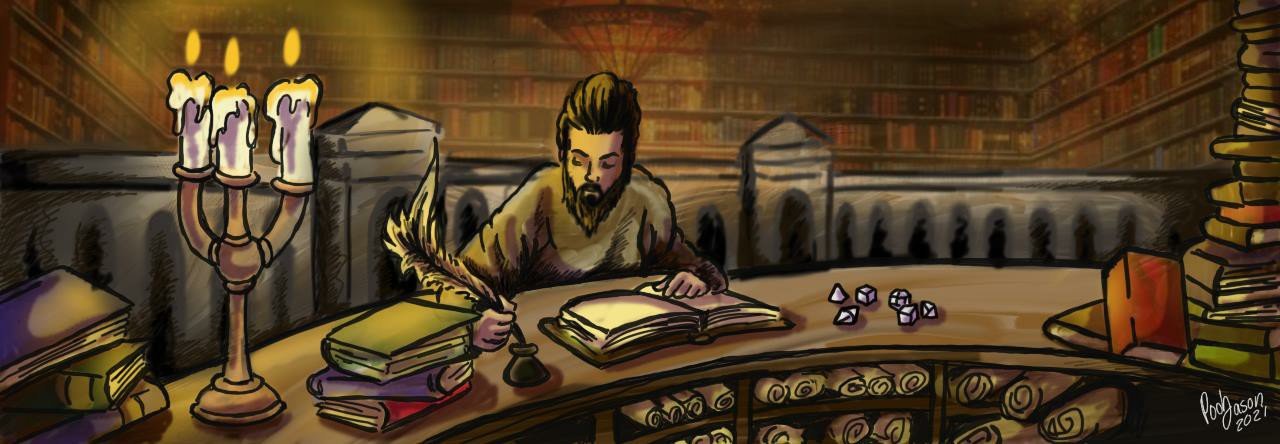This herb, which one calls ‘artemisia’ and by another name ‘mugwort’ is produced in stony and sandy places; when someone wishes to begin a journey, have him take this herb artemisia in his hand and have it with him, then he will not find the journey too great; and it also drives off demonic possession and in the house, where he has it inside, it forbids evil leechdoms and also it averts the eyes of evil men.
Entry XI, The old english herbarium, trans. pollington (2000)

**All information in this post regarding the uses of various plants are for gaming purposes only. This information does not represent actual medical guidelines/recommendations.
Mugwort (Common)
Name: mugwort (mucgwyrt = “fly (midge) plant”; in folklore, the word ‘mug’ is associated with a cup for beer and calls to mind mugwort’s use as a flavoring agent for beer)
Other Local Names: wormwood, midge wormwood. Note, however, that wormwood can also refer to a different plant
Latin(-derived) Names: artemisia
Modern Species Name: artemisia vulgaris
Where Found: waste places, sandy areas, roadsides, along paths, and weedy places
Medicinal Value: infusions and tinctures of mugwort are used to treat various digestive issues, as well as fevers; salves used to treat various muscle aches, bruising, and general bodily soreness and fatigue; travelers use to ward off misfortune and treat sore feet; a poultice of ‘green’ mugwort and beer has been used by some to ease menstrual cramps
Other Uses: bitter-tasting leaves are edible and can be eaten raw or cook, sometimes used to flavor meats and other foods; used to flavor beer; insect repellant, especially moths; commonly used in combination with other herbs for various herbal remedies
If the foot be sore, dwarf elder leaf, waybread, and mugwort, pound and lay them on, and bind them hot thereon.
Entry 51 from Bald’s Leechbook – Book III, trans. pollington (2000)

Mugwort Remedies in D&D
Pseudo-Historical / Magic-free Games
For pain of the innards take this same plant (i.e., mugwort), and pound it to dust and mix it with new beer, give it to drink, soon it soothes the pain of the innards.
Entry XI excerpt, The old english herbarium, trans. pollington (2000)
Ease Innards Remedy: Drinking a mixture of ground mugwort and fresh beer may:
- ease various digestive discomfort/issues.
- provide a +1 bonus on Saving Throws that are called for as a result of eating or drinking something that causes digestive (‘innards’) issues.
Against Weariness Remedy: Applying a prepared salve or a hot compress of mugwort to one’s feet may:
- relieve soreness/pain caused by overexertion or prolonged travel by foot.
- provide a minor bonus to exhaustion-based mechanics (if such mechanics are used in one’s game).
- increase the distance a character can typically travel in a day.
- serve as a form of preventive care by preventing various forms of foot-rot.
Fever Remedy: Drinking an infusion of mugwort may:
- help alleviate a fever, perhaps by providing a Saving Throw bonus.
Referees wishing to lessen the regular effectiveness of herbal remedies could require a Saving Throw to determine if the ill effects affecting a character are prevented/avoided. Failed Saving Throws could represent ineffective remedies.
Low Magic/Fantasy Games
Remember, mugwort, what you revealed / what you set out in mighty revelation / […] you are called oldest of plants / you have might against three and against thirty / you have might against the evil that travels around the land.
Entry 79 from the Lacnunga Manuscript, trans. pollington (2000).
Against Poison: Drinking an infusion of mugwort may:
- allow a Saving Throw vs. Poison to be made at an Advantage (i.e., roll 2d20 and keep the best result). If the remedy is taken after the character has already failed an earlier Saving Throw, then the remedy could prompt a new Saving Throw attempt. This assumes the character survived the previous failed roll and is still suffering the effects of being poisoned.
Against Loathsome Things: Burning a dried bundle of mugwort and then purifying oneself (and/or others) with the cleansing smoke may:
- provide the same advantages as a Bless spell.
Against Crawling Things (infusion): Pouring a prepared infusion of mugwort over a small patch of ground, like a garden, may
- rid the area of harmful bugs and other insects, perhaps improving the chances of a successful harvest.
Against Crawling Things (tincture): A concentrated tincture of mugwort applied to the skin may:
- act as repellant against flies, mosquitos, and other pesky and biting pests.
High Magic/Fantasy Games
The following remedies could significantly impact the niche role of the magic-user class (or cleric class) if open to all character classes. Referees are encouraged to consider this before implementing such remedies into their games. One suggestion is to limit the following fantastical remedies to certain specialized classes.
Drive Away Evil: Burning bundles of dried mugwort and wafting the smoke throughout a home may:
- provide a cleric (or possibly any character) a bonus when attempting to “turn” or drive away a lingering evil spirit or ghost.
Ward against Evil: Warding the perimeter and inside of a home with multiple hanging bundles of dried mugwort may:
- provide all those within the home the same benefits offered by the spell Protection from Evil. That is, certain malevolent creatures would not be able to enter the home. The “evil” could be against certain types, as defined by the Referee.
Ward against Evil Eyes: Wearing a bundle or pouch of mugwort may:
- counteract/block any magical form of seeing directed against a character (e.g., Clairvoyance, Wizard Eye, etc.).
- allow a character to pass through an area being watched by those with “evil” intentions undetected. This could be treated as a temporary form of invisibility (very powerful) or as a bonus that improves the chances of remaining undetected. The mugwort helps “avert evil eyes.”
For a Safe Journey: Wearing a bundle or pouch of mugwort that has also been empowered by the spells of a magic-user may:
- reduce or eliminate the numbering of Wandering Monster/Encounter checks during a journey through the wilderness.

If you liked this post, also see my post on Adderwort. If you want to read other posts dealing with wilderness survival, foraging, and/or herbal remedies, then check out these two posts Herbal Lore & Remedies in D&D and Foraging, Hunting, & Wilderness Survival in B/X D&D.
Peace,
RC
All translations from the Herbarium, Bald’s Leechbook, and the Lacnunga are from Stephen Pollington’s Leechcraft: Early English Charms, Plantlore, and Healing.

Boy the “professor” really comes out in your D&D research 🙂
Hope all is well and thanks for the post!
Hi Ron,
Lol! That’s funny. Yea, I guess it does. All is well with me, and I hope you are also well. Thanks for your kind words and for swinging by!!
Peace